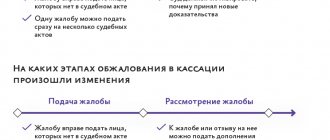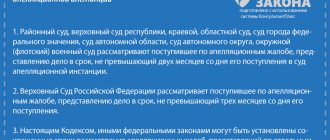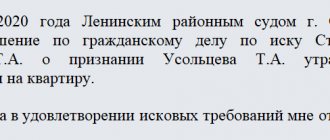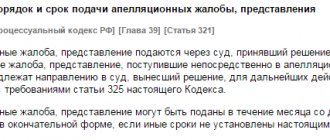The legal term “Appeal” means an appeal against judicial decisions that have not entered into legal force in civil or criminal proceedings.
The appeal can be complete or incomplete. A full appeal involves a complete review of the entire case from the beginning, in accordance with the rules provided for trial courts.
In case of an incomplete appeal, the case is reviewed solely on the basis of the arguments of the appeal.
Cassation (cassation appeal) is understood as an appeal, protest or reversal of a court verdict passed in a higher court.
Appeal against decisions
By way of appeal, decisions of the court of first instance that have not entered into legal force are appealed.
An appeal can only be filed through the court where the verdict was rendered.
It is allowed to file an appeal within 1 month from the moment the court decision is made in final form.
The Court of Appeal considers the case within the framework of the arguments presented in the appeal. The document must contain:
- the name of the court where the complaint is filed;
- the name of the person who applied to the said authority, indicating his place of residence or location;
- an indication of the court decision subject to appeal;
- the requirement of the person who filed the complaint and the basis on which the subject considers the court verdict to be incorrect;
- list of documents attached to the main one.
The appeal is signed by the person filing the claim or his representative (which must be confirmed by a power of attorney). Documentary evidence of payment of the state duty (if payable) is attached to the complaint.
The appeal should not contain claims that were not stated in the court of first instance. Referring to new evidence is allowed only if the impossibility of presenting it in the court of first instance is substantiated.
Courts of general jurisdiction (with the exception of the Supreme Court of the Russian Federation) are required to consider submitted documents within a period not exceeding two months from the date the case is received by the court.
The appeal is being considered by the Supreme Court of the Russian Federation for 3 months.
The appeal replaced cassation in civil proceedings. Key Features
On July 21, 2018, the main provisions of the Law of January 8, 2018 N 94-Z “On Amendments and Additions to the Civil Procedure Code of the Republic of Belarus” came into force. The changes affected the procedure for appealing court decisions of district, city and regional courts. The main one is the introduction into the civil process of a new institution of appeal against court decisions. It replaced the mechanism for reviewing decisions through cassation procedure.
Let's look at the key differences between the new appeal procedure and cassation procedure.
1. During the appeal, the minutes of the court hearing are kept.
The minutes of the court hearing are important evidence in the case. It records the procedure for considering the case, the progress of the process, and the interrogation of witnesses. On the record of the court hearing in the appeal, as in the court of first instance, you can make comments in case of incompleteness or incorrectness of the data. This creates additional guarantees to protect the interests of the parties.
2. The period for filing a complaint against a decision of the court of first instance is being extended.
Now you can file an appeal within 15 calendar days from the date of:
1) announcement of the decision;
2) receiving the reasoning part of the decision;
3) an additional decision, if one was made.
The deadline for filing cassation appeals was 10 calendar days from the date of announcement of the decision or delivery of the reasons to the cassator at his request. When the court made an additional decision, the deadline for filing a complaint against the main decision in the case did not change.
3. There is an opportunity to present new evidence
This opportunity arises if the party can justify why it did not present this evidence in the court of first instance.
Unlike the appeal, the cassation court, as a general rule, did not accept new evidence. Its function was not to review the decision, but only to verify its legality.
4. Opportunities for examining evidence are expanding.
The court may question witnesses at the hearing and order an expert examination of the case. This allows, when reviewing a decision, to take into account as many circumstances as possible that could affect the outcome of the case.
5. A period is established within which objections to the appeal must be submitted to the court
This must be done no later than 5 days before the court hearing. If it is necessary to postpone the process because a party has violated this rule, the court has the right to oblige it to compensate the legal costs of other parties to the dispute, regardless of the outcome of the case.
Objections to the cassation appeal could be submitted to the court both before the trial and directly at the court hearing.
6. The scope of consideration of the case is narrowed
As a general rule, the appellate court reviews the case only within the limits of the arguments set out in the appeal. And only if, when checking the decision in the appealed part, it turns out that the court violated or incorrectly applied the rules of substantive or procedural law, the appellate authority has the right to check the decision in full.
In cassation, the court was not bound by the arguments of the cassation appeal. He was obliged to check the decision in full, although in practice he was still limited to the limits of the parties' arguments in the complaint.
7. A deadline is established for consideration of the case in the court of appeal.
This period ranges from one month from the moment the case is submitted to the court (general term) to four (maximum term for complex cases).
The rules governing the procedure for considering cases in cassation did not, in fact, establish a time limit for consideration. The cassation court was supposed to consider the complaint on the day appointed by the trial court. In practice, this led to an unreasonable delay in the consideration of cases in cassation.
8. The opportunity to use information technology in court has expanded
Appeal hearings may be held via video conferencing. This avoids transport and time costs and is convenient for parties located in different regions.
A list of cases scheduled for hearing on appeal must be published on the court’s website no later than the day before the trial. This requirement increases the level of openness of the process and the parties’ awareness of the trials in which they participate.
9. The possibilities for making a new decision on the case are increasing.
The appeal institution is guided by the fact that, when violations committed by the court of first instance are identified, the case is reviewed and, if necessary, a new court ruling is adopted.
The cassation court, as a rule, was forced to send the case for a new trial. A new ruling in the case could be made only if the court of first instance correctly established all the circumstances.
On appeal, the opportunity to transfer the case for a new trial to the court of first instance was preserved. However, the court has the right to do this only if, during the consideration of the case, it establishes a significant violation of the rules of procedural law. Moreover, this violation cannot be eliminated in the course of appeal proceedings, or it prevents the court from examining new evidence or establishing facts that were not the subject of investigation by the court of first instance.
10. Complaints against the decision of the court of first instance are considered by the judge alone
In contrast to appeals in cassation, private complaints against rulings of the courts of first instance were considered collectively by three judges.
Main conclusions
In general, the changes are positive, as they expand the capabilities of the court of second instance. He is no longer limited to formal verification and control, but can completely review the case, including establishing new facts, calling witnesses, and collecting new evidence.
It is expected that the changes will reduce the procedural time of justice, namely:
— reduce the number of cases that are sent to the court of first instance for a new trial;
— increase the number of cases in which the final decision is made by the appeal court, and, if necessary, change the decision on the merits.
The institution of appeal introduced into the civil process differs from the similar institution in the economic process. Among the differences, for example, is the ability to send the case for a new trial to the court of first instance.
The appeal replaced cassation in civil proceedings. At the same time, both institutions remained in the economic process. Therefore, it is not clear how further unification of the norms of civil and economic proceedings will be carried out in the context of the preparation of a unified procedural code.
It is also not entirely clear how individual rules governing the appeal process will be applied. It is expected that the Plenum of the Supreme Court will adopt a separate resolution on issues of appeal in civil proceedings, in which it will provide additional clarifications.
Cassation complaints (cassation protests) filed before July 21, 2018, but not considered, will be considered by the courts according to the rules established by Chapter. 32 of the Code of Civil Procedure for appeals and protests.
Appeal
An appeal is an opportunity to appeal a court decision if one of the parties believes that it was made illegally or that there were errors, for example, violations of the procedural code.
This gives the right to appeal to a higher court with a request to verify the legality of the decision before it comes into force. An appeal is filed through the court that made the decision, but the addressee is the court of appeal. Read more about how to write an appeal here.
There are two types of appeal: full and incomplete. A full appeal involves consideration of all the circumstances of the case, taking into account all the facts, including those that were not previously presented at the lower court hearings. The court itself examines the case and makes a decision on it, without sending it to the court that dealt with the case before.
Incomplete is a proceeding based directly on a court decision. In this situation, the court decides whether there was a violation of rights by the court that made the decision. The arguments for consideration are given in the complaint itself. Generally, the presentation of new evidence in this case is considered inadmissible; an exception can only be made as a last resort, for example if, due to a miscarriage of justice, these facts were not considered earlier. If any violations were identified in the consideration of the case, it may be returned to the lower court for reconsideration.
With a full appeal, the court checks how the case was examined and the verdict was reached, and with an incomplete appeal, it only considers the decision.
Instructions: how to draw up a cassation appeal
To the Fourth Court of Cassation of General Jurisdictionaddress: 350906, Krasnodar, st. Morskaya, 3
Applicant for the complaint, plaintiff: State budgetary educational institution
additional education for children
specialized children's and youth sports school of Olympic reserve "Allur"
GBOU DOD SDYUSSHOR "ALLUR"
Address: Moscow, 3rd budget passage, 1
Defendant: Viktorova Victoria Viktorovna
Rostov-on-Don, st. Profitable, 2-2
Case No. 88-222/2021
Appeal
On December 11, 2021, the Sovetsky District Court of Rostov-on-Don made a decision in a civil case in the lawsuit of the State Budgetary Educational Institution of Children's and Youth Sports School "ALLUR" against V.V. Viktorova. on debt collection under a loan agreement. The court's decision rejected the claims in full.
This decision was appealed to the appellate court. By the decision of the Third Court of Appeal, the decision of the first instance court was left unchanged, and the appeal was not satisfied.
We believe that when issuing the above judicial acts, the norms of substantive law were significantly violated and were interpreted incorrectly.
In addition, the conclusions of the courts of first and appellate instances do not correspond to the actual circumstances of the case.
Viktorova V.V. funds were received in the amount of 50,000 rubles and 30,000 rubles, which is confirmed by receipts dated 10.10.2020 and dated 10.22.2020. In accordance with the text of these documents, the funds should have been returned on October 20, 2020. However, Viktorova V.V. I returned the money only partially, in the amount of 3,000 rubles. The rest of the debt has not yet been repaid. The original receipts are in this case.
According to the text of the receipts, Viktorova V.V. undertakes to return the money, the defendant wrote these receipts in her own hand, affixed her signature, and did not challenge them in court, as well as the obligations to return.
Since Viktorova V.V. received these funds without the grounds provided for by law, then she is obliged to return them as unjust enrichment. The violation of the plaintiff’s rights consists in the fact that he is deprived of funds, the circumstances on which the claims are based are receipt of unjust enrichment, receipts are evidence, they confirm the existence of legal relations and a violation of the plaintiff’s rights.
The courts stated in their decision that they did not provide evidence of the validity of the plaintiff’s claims. We believe that this assertion is unfounded; the evidence is available in the case materials.
Written, documentary evidence and receipts are provided. They confirm the main thing that there are obligations that have not been fulfilled. The amount is indicated, the defendant’s signature is present, documents were drawn up in front of witnesses. Viktorova V.V. signed that she undertakes to return the funds.
The circumstances of the transfer of money are established from the accompanying facts. Thus, there is information about the initiation of a criminal case regarding the theft from the State Budget Educational Institution of Children and Youth Sports School "ALLUR" by teacher V.V. Viktorova. money, about writing receipts right in the court corridor before the court hearing of V.V. Viktorova. that she owes funds from the State Budget Educational Institution DoD SDYUSSHOR "ALLUR", with lawyer A.A. Zimin as a witness. This was followed by the filing of an application to terminate the criminal case due to reconciliation. There is an order to deposit funds into the legal entity's cash register. All these circumstances are established in the case materials and the court decision. But it is indicated that the conditions for providing funds are not specified. We believe that the conditions and fact of the transfer of funds are proven by all the collected materials.
From the totality of the data, it becomes clear why the funds were transferred; their transfer is confirmed.
Based on the above, guided by Articles 376, 379.7, 390 of the Civil Procedure Code of the Russian Federation,
Ask:
Cancel the court decisions, make a new decision without sending the case for a new trial and satisfy the claims.
List of attached documents (originals):
- Documents confirming the sending of the cassation appeal to other persons participating in the case - 1 copy.
- Document confirming payment of the state duty (3,000 rubles for legal entities) - 1 copy.
- A document confirming the powers of the director (minutes, order, extract from the Unified State Register of Legal Entities).
March 17, 2021
Signature of the applicant (plaintiff): Director Ivanov I.I. Ivanov
Who can file a cassation and appeal?
Cassation and appeal proceedings exist in criminal, civil and economic proceedings. The range of subjects who have the right to lodge a complaint is quite wide. Thus, in criminal law, parties, interested parties, the prosecutor or the prosecutor can appeal a decision in cassation.
Persons who participated in the consideration of the civil case can file an appeal. Others can file a complaint only if the court's decision will affect their rights and obligations, which they must indicate in detail in the text of the complaint.
The process for claiming a case is as follows. When the judge reviews your appeal, there is no criminal case before him, only the appeal for review and the previous court decision. If the judge does not find any grounds for reviewing the case, he refuses to transfer the cassation appeal for consideration. If he has any doubts about the legality of the appealed court decision, then the judge has the right to request the case materials for additional verification.
Differences between a cassation complaint and an appeal
The difference between these two types of complaints concerns several aspects:
Entry of the verdict into force
This is a fundamental difference, because if the sentence is not yet in effect, then an appeal is filed, if it is in effect, a cassation is filed.
Possibility of providing new evidence
The easiest way to do this is with a full appeal. In the case of an incomplete appeal and the court of cassation, this is only possible under certain conditions:
- there was a proven violation of procedural order;
- it is proven that the violation resulted in an insurmountable error and is directly related to new evidence or details of the case;
- there is a good reason why this evidence was not provided earlier.
If we are talking about cassation, then the petition should be about taking into account new details, and not about adding them to the case.
Collecting all this information can be difficult, proving it can be even more difficult, and there is no guarantee that the court will take it all into account.
"Achilles' heel" of continuous cassation
Changes to the legislation on cassation appeals in courts of general jurisdiction, which entered into force on October 1, were introduced in order to increase the efficiency of the mechanism for ensuring the legality of court decisions, as well as to “revitalize” and enhance the functions of the cassation instance in civil proceedings.
Indeed, “continuous cassation” in cassation courts of general jurisdiction, as well as courts with a renewed judiciary, often geographically distant from lower courts, gives hope for the “resurrection” of the principles of independence and independence of cassation proceedings.
At first glance, these innovations contain solid “advantages”. But, as you know, the coin has two sides, and when implementing the principle of complete cassation in practice, remaining unresolved problems began to appear. The “Achilles heel” of the new cassation appeal procedure was the receipt of a writ of execution after the court decision entered into legal force.
In accordance with Art. 428 of the Code of Civil Procedure of the Russian Federation, a writ of execution is issued by the court to the claimant upon his application after the court decision enters into force and, at his request, is sent for execution directly by the court.
In practice, we are faced with a problem: as soon as a case from the appellate instance is returned to the first instance, where a cassation complaint filed under the new rules of appeal is already awaiting it, literally the next day it is sent to the cassation court. If the claimant does not decide almost immediately after the court decision enters into force to submit an application to the first instance for the issuance of a writ of execution or a petition to send it to the claimant, then there is a high probability of finding out in the office that the writ of execution cannot be issued, since the case has already been transferred to cassation. Accordingly, according to the logic of the court staff, if there is no case, there is no writ of execution.
This situation obviously violates the claimant’s right to timely execution of a court decision, as well as the norms of the Code of Civil Procedure of the Russian Federation and leads to failure to fulfill the principles, goals and objectives of legal proceedings.
In my opinion, this problem could be solved in the following ways.
The first method, although it will not solve this problem fundamentally, will temporarily alleviate the situation - after the decision enters into force, the claimant submits an application for the issuance of a writ of execution. Then we can only hope that the court employee will not ignore the application and will still produce a document before sending the case to cassation.
This mechanism has not yet been tested in practice, but there are already concerns that it may malfunction, since the period while a civil case returned from appeal remains in the first instance before being sent to the cassation court is only a few days, during which a court employee You may not have time or simply forget to prepare a writ of execution.
The second method seems to be more workable; it consists in drawing an analogy with the agrarian and industrial complex of the Russian Federation. Thus, in arbitration proceedings, the principle of continuous cassation has been in effect for a long time. According to Art. 319 of the Arbitration Procedure Code of the Russian Federation, a writ of execution is issued after the judicial act enters into force, with the exception of cases of immediate execution (in such situations, a writ of execution is issued immediately after the adoption of a judicial act or its appeal for immediate execution). The specified document is issued at the request of the claimant or, at his request, is sent for execution directly by the arbitration court. I note that sending the case to the cassation instance in the arbitration court does not prevent the claimant from obtaining a writ of execution.
It would seem that the rules are identical, but they work differently in different courts. I believe this is explained by the fact that the arbitration case is stored in court in electronic form and its physical presence is not essential for the production of a writ of execution. In addition, in arbitration courts - at least in Moscow and the Moscow region - a positive practice has developed when a writ of execution is prepared by the court and sent to the claimant, regardless of the petition filed.
We can only believe that the chairmen of courts of general jurisdiction will not remain indifferent to this seemingly insignificant, at first glance, problem and will be able to learn from the positive experience of implementing full cassation from arbitration courts. Otherwise, the long-awaited receipt of the writ of execution will be delayed for the duration of the cassation hearing of the case, thereby aggravating the already difficult situation with the execution of the court decision.
In conclusion, let us give an example from our legal practice.
The decision of the Tverskoy District Court of Moscow in a civil case on the recovery in favor of our clients of a sum of money in excess of 6 million rubles. entered into force on November 18, 2021 on the basis of the Appeal ruling of the Moscow City Court.
According to the Moscow City Court on December 3, 2021, the case was sent to the Tverskoy District Court of Moscow. Then, on December 9, through the expedition of the district court, in the interests of the claimant, we filed an application for the issuance of a writ of execution, but the office staff refused to issue a writ of execution, citing the fact that the case was sent to the cassation court.
Naturally, we filed a complaint with the chairman of the Tverskoy District Court with the hope that this would somehow speed up the issuance of the writ of execution. Fortunately, at a personal reception the chairman heard our arguments and the writ of execution was received. In this regard, it is believed that in the future it will be easier for claimants to exercise the right to timely execution of a court decision.





